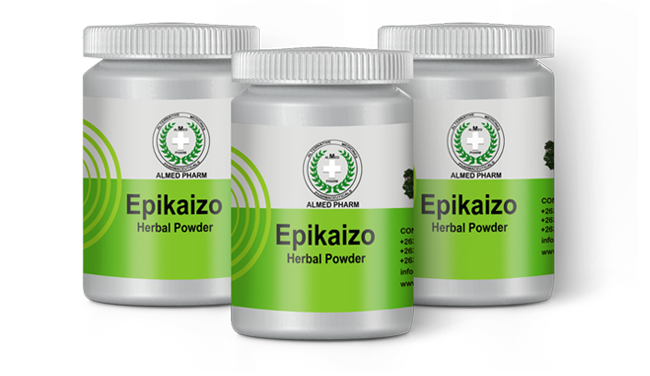
A purported new HIV herbal remedy known by the name Epikaizo was “unveiled” in Harare last week with claims that it inhibits and eliminates the viral antigen.
BY PHYLLIS MBANJE
The Standard last week visited the offices of the distributors of this herb, Alternative Medicines Pharmaceuticals (AlMed Pharm) in Harare’s Greendale suburb where the front office was a hive of activity with scores of people queuing to be served. Inside, the receptionist was busy fielding endless calls from people who wanted to know more about the medicine. The “miracle drug” costs US$120 for a month’s supply.
One of the distributors, Crispen Moyo showed the news crew two small bottles, that contained what he claimed was the miracle cure — a powder which is taken with plain maize meal porridge.
“Almed Pharmaceuticals manufactures biologically based complementary medicines and products,” he said.
Information on the accompanying leaflet says the herbal remedy, which is produced from natural plants, has anti-viral properties which make it “very effective in eliminating the HIV antigens from the body, thus enabling the body to fight opportunistic infections”.
The medicine allegedly destroys the virus from infected cells, limiting viral replication to minimal levels.
“After the full course of treatment, a once HIV-positive person will test negative and this condition is referred to as ‘remission’,” reads part of the leaflet.
The leaflet however emphasises that when a person is in remission condition they still carry the HIV antibodies.
“They still carry the HIV antibodies but are not harmful to health. If a patient is on ARVs or any other medication, they should continue taking their medicine because Epikaizo does not cause any drug interactions,” reads the leaflet.
Moyo said herbal medicine had minimal side effects unlike conventional anti-HIV drugs.
However, Medicines Control Authority of Zimbabwe (MCAZ) spokesperson, Richard Rukwata said although AlMed Pharm had submitted a sample for testing, it was premature to start selling the product before the assessment was completed.
MCAZ was however powerless to stop its sale, he said.
“Right now we just have broad powers and when one wants to sell these products we carry out some tests and assessments,” he said.
He said MCAZ currently had limited power in terms of launching a full scale assessment of these herbal claims. Their tests are limited to bio-burden (checks for contamination) and presence of heavy metals like lead.
“We are having serious problems with the absence of a law that precisely mandates us to control and oversee the process of using these remedies as alternative medicines,” he said.
Rukwata said the Health ministry had promised to craft a law that would ensure that there are structures and procedures that are followed when dealing with complementary medicines (herbal) in the interest of public interest.
The Ministry of Health and Child Care has for several years been planning to enact a legislation that empowers MCAZ to have control over local manufacturing and distribution of all herbal products in the country, but that has not happened.
“If there was an appropriate law we would do more comprehensive and sophisticated tests because the herbs are unknown entities and we have nothing to compare them to,” said Rukwata.
“Right now we are working with Zimra to try and stem out the importation of some of these herbal remedies, but we need the back up of a legislation that clearly speaks out on the course of action that we need to take. Our hands are tied.” Deputy Minister of Health and Child Care, Paul Chimedza on Friday said he would look into the issue and update on the progress of the draft legislation.
Meanwhile, in the absence of legislation the herbal medicines, whose effects have not been scientifically proven, continue to flood the local market.
Last year, there was excitement over another “miracle cure” from Zambia, Topvein, which also found its way onto the Zimbabwean market. Ten years ago, Zimbabwe was among several African countries that were caught up in the African potato craze, which later proved to be hazardous to health without any known benefit.
The potato, also known as hypoxis plant, was popularised by the then Health minister of South Africa, Mantombazana Edmie Tshabalala-Msimang.
The now late Tshabalala-Msimang received a lot of criticism for claiming herbs treated HIV and Aids better than the ARV drugs. However, research into the herb produced disturbing news.
A scientific study conducted by the University of Stellenbosch’s Nutrition Information Centre (Nicus) said extracts from the African potato, “has been questioned and remains a cause of serious concern”.
A study on the safety and efficacy of the African potato extract in HIV-positive patients was terminated prematurely, because most of the patients who received the extract showed severe bone marrow suppression after eight weeks.
Other common herbs that have been associated with unsubstantiated claims of HIV and Aids cure include Moringa (oleifera), Chifumuro, Mzumbani, Musukavakadzi, Musosote, Ngoka 11 (from Tanzania), Ndorane and Mutsine (Black Jack).











